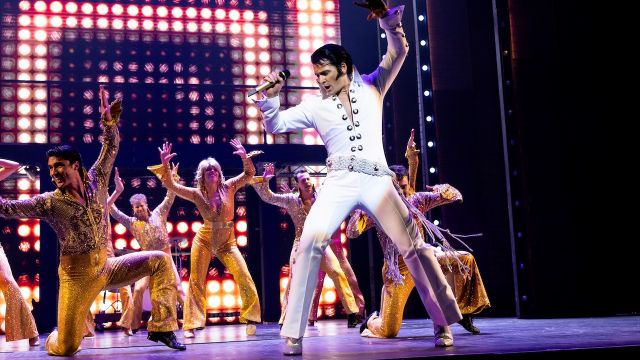Elvis is in the Building
Photographer: Ken Leanfore
Wise men say only fools rush in to recreate an icon on stage, but the star and director of Elvis: A Musical Revolution say you won’t be able help falling in love with their production. David Spicer reports.
Rob Mallett can’t say he’s hungered to touch the songs of Elvis Presley on stage a long, lonely time. In fact, the musical theatre and Home and Away star had only a passing interest in the unchained melodies of the King of Rock’n’Roll, catching him on mid-day movies and through popular culture.
But when he scored the lead in the musical, Elvis: The Musical Revolution, which opens in Sydney, followed by a Melbourne season and an expected national tour, Rob started working like a hound dog and discovered that lots of people he admired were influenced by Elvis (OK, I’ll pause on the puns).
“I grew up on Irish dancing. Michael Flatley was a big hero of mine and he came on stage with eye shadow, and dressed head to toe in leather, which screams Elvis,” he said. “I was a punk rock tragic, and Elvis was there at the birthplace of rock’n’roll. I can’t imagine where we’d be without his input in those early days.”
The more Rob looked into the back story, the more he became fascinated by the pure unlikelihood of it.
“Elvis embodied this almost mythical American Dream. He was born in poverty in the south and rose to extraordinary fame and fortune.
“It happened early and quickly. Nearly 150 songs of his made it into the Billboard Hot 100 and 114 made the Top 40. Name another solo artist who came close to that? He was dead by 42. It all happened fast and furious for him.”
“At every point (it was unlikely). His first recording at Sun Studios could have been left on the cutting room floor. Yet one recording assistant hung onto it.
“Look at each of these elements - his hair, his fashion, his voice and his dance movement - but he is greater than the sum of all these parts. There was some magic created when all these things lined up.
“I think it was a perfect storm that created Elvis. If he sounded like he did, but did not dance like he did, maybe he would not have succeeded.
“The fact that he arrived on the scene just as middle Americans were getting televisions in their loungerooms gave people a chance to see him dress and dance differently.”
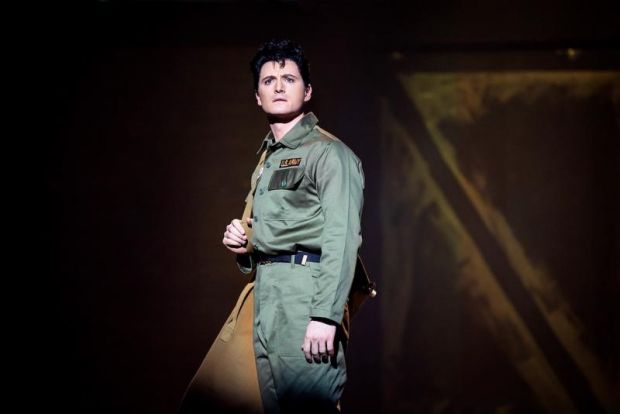 Photographer: Daniel Boud
Photographer: Daniel Boud
The piece focusses on the unique fusion of different musical styles that Elvis mastered.
“Before Elvis, each community had their own sound. He brought Blues Roots, Gospel and ballads together into the mainstream dominant culture. He reached across the divide of conservative boundaries to create a new sound.”
Elvis: A Musical Revolution, written by David Abbinanti and Sean Cercone, includes 40 songs recorded by Elvis.
The writers say, “there was no roadmap, no guide, and no limit on what could be created. His journey, from a dirt-poor shotgun shack in Tupelo, Mississippi to a singular name, Elvis, has fascinated generations and we’re excited to have him tell it in his own way.”
The musical is based on the lead-up to his 1968 comeback tour.
The director of the Australian production, Alister Smith, says, “this is not a womb to tomb story. It focuses on a very specific moment in time and looks back at the impacting moments in Elvis’s life.
“The 1968 concert changed everything for Elvis. The musical explores the key moments of musical revolution that Elvis impacted and lead to this moment of artistic brilliance.”
 Photographer: Ken Leanfore
Photographer: Ken Leanfore
Alister describes the musical as being closest in style to Buddy: The Buddy Holly Story and The Boy from Oz.
“It echoes the way these two works use music in the narrative and the way it engages with their audiences. The songs are used as part of scenes in concerts, television performances, recording studio sessions and movie sequences. The joy of using the Elvis cannon is that all the songs are an absolute pleasure to hear and never fail to hit right.”
The production has been endorsed by the Elvis Presley estate, but Smith says it does not sugar coat his life.
“It doesn’t shy away from his troubled years in Hollywood and the relationship complexities with Pricilla, his mother and manager Colonel Parker. It’s fundamentally a story about an artist in crisis and how he braved his own inner demons to find himself as an artist.”
Impersonating Elvis Presley has become almost an industry, with Parkes in regional New South Wales hosting a whole festival dedicated to ‘The King’.
As part of the audition process hundreds of actors made submissions.
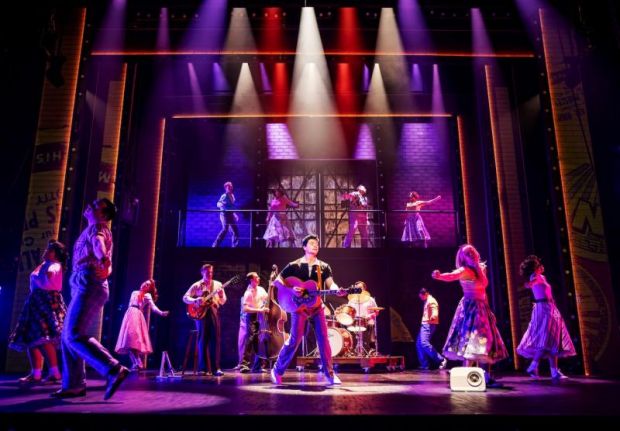 Photographer: Daniel Boud
Photographer: Daniel Boud
“I was not looking for an impersonator for this musical. I was looking for an actor who could embody the essence of this incredible artist, and while he needs to be able to hit the marks singing those songs, and embody the physicality, we needed someone to tell the emotional and psychological story of this man.
“Rob sends shivers through your body when he performs. This is the true measure of X-Factor for me. When an actor does this to me in the audition room, I know they’re the one.
“Since this is a new production, I need to be making this show with a collaborator who can turn our ideas into magic. Rob has this quality. Australia is going to fall in love.”
Part of the audition brief included being able to play the guitar and dance well.
Rob Mallett was a recreational strummer and is now on a crash course to play like Elvis Presley.
“I am on a steep learning curve. Luckily he was only on the rhythm guitar,” Rob said with a little relief.
On the dance front, he has a bigger head start. His first professional gig after graduating from WAAPA was in the cast of the tap-dancing extravaganza Hot Shoe Shuffle. Rob describes Elvis’s way of moving as spiritual.
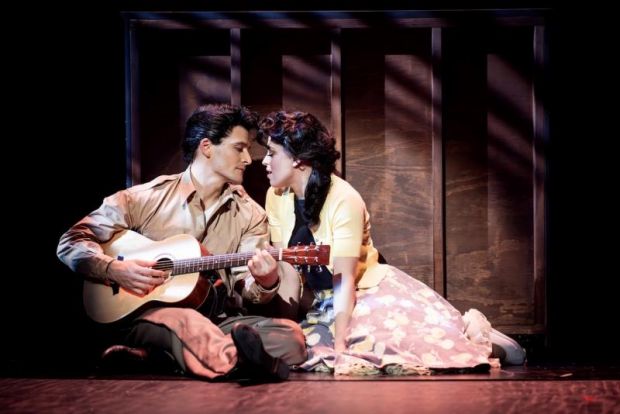 Photographer: Daniel Boud
Photographer: Daniel Boud
“It came impulsively and naturally. He was inspired by the (Afro-American) singers he grew up around and by Gospel.
“Often it is bubbled out, his legs would start shaking and explode to the audience. It was athletic.
“Elvis was born a twin and his brother died early. Some people say when one twin dies the other carries the strength of two men. He pushed himself to exhaustion in the early days and ended up in hospital. He held nothing back.”
Studio executives famously kept his gyrating hips off camera when he appeared on television.
“His pelvis was too much to see on TV. But he started something he could not keep in a box.”
Rob admits that recreating that energy in a long running musical is a challenge.
“What would an Elvis musical be without Elvis in every scene? In his early years he would sing those (difficult) songs as a one-off belt in a recording studio. He did not have to consider the health of his voice, whereas I have to do it seven or eight times a week.”
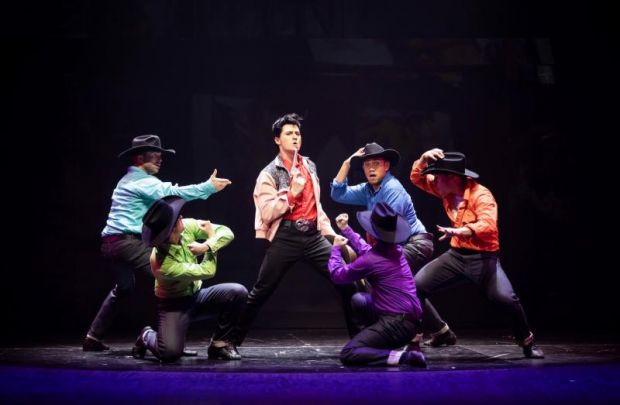 Photographer: Daniel Boud
Photographer: Daniel Boud
The production will inevitably draw comparisons with the recent Baz Luhrmann movie.
Rob says, “the movie was great. It captured the hysteria, the fever pitch fandom and focussed on his relationship with his manager. The musical shows us why Elvis changed the music world as we know it.”
Alister says, “trying to tell the story of Elvis and his career without including Colonel Parker is impossible. So, this character has a major presence as he was a monumental impact on Elvis’ career. We have musical theatre royalty, Ian Stenlake, playing this iconic role so expect a take on the character that is unlike anything you’ve seen before. Ian plays the showman with a darkness that is remarkable.”
There is also a part for a young Elvis in the musical, which is being shared by four children.
“We had a room full of 10-year-old performers, all so passionate and excited about the work of Elvis. The new generation resonates with him still, wshich proved the power of Elvis is enormous and that he will live forever!”
The Australian premiere of Elvis: A Musical Revolution will play at Sydney’s State Theatre from 5 August, before rocking into Melbourne’s Athenaeum Theatre from 6 October.
Subscribe to our E-Newsletter, buy our latest print edition or find a Performing Arts book at Book Nook.

